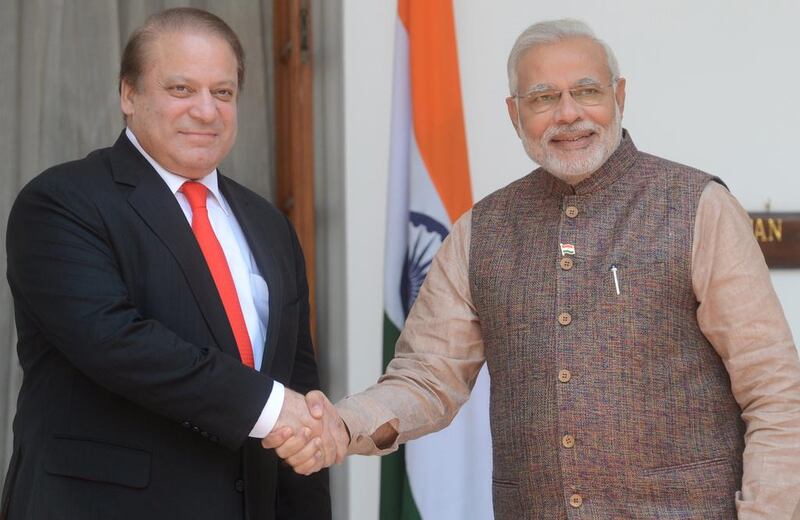Apparently many in Pakistan were not amused when US secretary of state John Kerry, on a visit there recently, chose to skip the traditional Pakistani breakfast of halwa puri and, instead, popped into a local Dunkin’ Donuts store for a quick bite of his native staple. He then rubbed it in by tweeting: “A little slice of home here in Islamabad: at Dunkin’ Donuts to start the day.”
Pakistanis saw it as a culinary snub pointing out how the same Mr Kerry had happily tucked into a Gujarati breakfast while in India a few days earlier. It was all in good humour but indicative of the intense sensitivities always lurking under the surface in India-Pakistan relations. Tensions have grown lately with the two countries barely on talking terms, and the now-on-now-off peace process is at a standstill. The government in Delhi led by the right-wing Hindu nationalist Bharatiya Janata Party (BJP) says it will not talk unless Pakistan brings the perpetrators of the 2008 Mumbai attacks to justice and stops supporting Kashmiri separatists.
In a serious escalation on New Year’s Day, Indian authorities intercepted a Pakistani fishing boat in the Arabian Sea on suspicion it was primed to repeat a Mumbai-style terror attack. The four men in the alleged “terror boat” – Pakistan has described them as petty smugglers – blew themselves up when challenged. The facts of the case remain mired in mystery. Pakistan has vehemently denied any role while, in turn, accusing India of “helping militants to carry out heinous acts inside Pakistan’’.
The growing tension is also reflected in a marked increase in incidents of border violations prompting Mr Kerry to convey to both sides Washington's "deep concern". Despite his appeal to the two countries to cease hostilities and move forward, the war of words has heated up. India's defence minister Manohar Parrikar and the army chief Gen Dalbir Singh have threatened "proactive'' retaliation against provocations from across the border. "Results will be visible next summer, say after six months," Mr Parrikar warned.
Arguably, India-Pakistan relations are at their lowest ebb since the Mumbai attacks. Islamabad’s failure to punish the alleged perpetrators of the 2008 attack on grounds that the evidence provided by India is not strong enough to stand up in court remains the main stumbling block because India insists that it can’t return to business as usual because of the Mumbai bombings.
Narendra Modi has also taken a tough stand on Kashmir. Within weeks of coming to power, he cancelled scheduled talks between the two countries’ foreign secretaries because he objected to the Pakistan high commissioner meeting with Kashmiri separatist leader Shabir Shah. That was when the slide began and since then both have hardened their positions.
There was a memorable image of Mr Modi and his Pakistani counterpart Nawaz Sharif looking away from each other – refusing even to acknowledge each other’s presence – when their paths crossed at a summit of South Asia Association for Regional Cooperation (SAARC) leaders in Nepal in November. Although persuaded later to shake hands and pose for the cameras nobody was taken in by this carefully choreographed show of bonhomie after widespread criticism of their churlish behaviour. Indian foreign office spokesman Syed Akbaruddin was careful to describe it simply as a “handshake”, telling the media cryptically that “if a handshake leads to meaningful dialogue we welcome it”.
Mr Modi came to power accusing the previous Congress-led coalition government of being soft on Pakistan and promising a harder line. He even suggested that peaceniks were antinational. That election rhetoric is now playing out in action belying the expectation that once in power he would be forced to temper it.
The basis for that earlier optimism was that in the past, relations tended to improve whenever there were right-wing governments in the two countries. It was Mr Modi’s BJP predecessor Atal Behari Vajpayee who made a bus journey to Lahore and signed the Lahore Declaration friendship pact in 1999, with none other than Mr Sharif who was prime minister then too.
Indeed, Mr Modi started well when he invited Mr Sharif, along with other SAARC leaders, to attend his swearing-in ceremony, earning much praise for his initiative. But India-Pakistan relations have a history of moving one step forward and then going two backward.
Amid all this, there was a rare moment of warmth when India observed a two-minute silence in solidarity with Pakistan after last month's Peshawar school terror attack. But it didn't take long for frost to return.
Hasan Suroor is a freelance journalist and the author of India’s Muslim Spring: Why is Nobody Talking About It?





